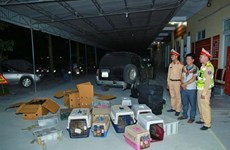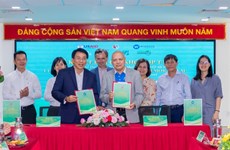WWF launches projects to promote sustainable development
The World Wide Fund for Nature (WWF) has officially launched three
projects which focus on promoting sustainable shrimp aquaculture,
developing responsible tourism and eco-tourism, and improving low carbon
development in Vietnam.
The World Wide Fund for Nature (WWF) has officially launched three
projects which focus on promoting sustainable shrimp aquaculture,
developing responsible tourism and eco-tourism, and improving low carbon
development in Vietnam.
The projects, with a total budget of 1.5 million USD funded by the Danish International Development Agency (DANIDA), will last from 2012 to 2014 and involve the participation of policy makers, the private sector and civil societies in every stage of planning, production and trading.
The objectives of the low carbon and sustainable energy development project are to build up sustainable renewable energy sources in Vietnam through supporting the development of energy policies at national and provincial levels.
It also includes pilot and replication initiatives on low carbon and sustainable energy development in household businesses and small and medium-sized enterprises of strategic sectors in central Thua Thien-Hue province.
The responsible tourism and eco-tourism project seeks to provide a specific model of how tourism activities around the protected areas can contribute to the sustainable incomes for local people, thereby reducing the pressure to exploit natural resources in and around the protected areas.
The project will involve travel agencies, national parks and local communities in developing community-based tourism models in Cat Tien and Bidoup Nui Ba National Parks.
Through directly involving local residents in tourism activities, the project has established a mechanism in which profits from the use of resources will in turn be used to benefit the locals and create a sustainable income for the local governments.
The success of the experimental model will be integrated into the National Guidelines on Community-based Tourism, which is currently under construction and will be applied to all protected areas in Vietnam. At the same time, the guideline will also facilitate investment in eco-tourism in protected areas.
Under the sustainable shrimp aquaculture project, WWF will provide training courses on management to ensure that production process is in accordance with the shrimp Aquaculture Stewardship Certification (ASC) standards. After that, officials from district’s Aquaculture Supporting Association will be responsible for supporting farmers in responsible production.-VNA
The projects, with a total budget of 1.5 million USD funded by the Danish International Development Agency (DANIDA), will last from 2012 to 2014 and involve the participation of policy makers, the private sector and civil societies in every stage of planning, production and trading.
The objectives of the low carbon and sustainable energy development project are to build up sustainable renewable energy sources in Vietnam through supporting the development of energy policies at national and provincial levels.
It also includes pilot and replication initiatives on low carbon and sustainable energy development in household businesses and small and medium-sized enterprises of strategic sectors in central Thua Thien-Hue province.
The responsible tourism and eco-tourism project seeks to provide a specific model of how tourism activities around the protected areas can contribute to the sustainable incomes for local people, thereby reducing the pressure to exploit natural resources in and around the protected areas.
The project will involve travel agencies, national parks and local communities in developing community-based tourism models in Cat Tien and Bidoup Nui Ba National Parks.
Through directly involving local residents in tourism activities, the project has established a mechanism in which profits from the use of resources will in turn be used to benefit the locals and create a sustainable income for the local governments.
The success of the experimental model will be integrated into the National Guidelines on Community-based Tourism, which is currently under construction and will be applied to all protected areas in Vietnam. At the same time, the guideline will also facilitate investment in eco-tourism in protected areas.
Under the sustainable shrimp aquaculture project, WWF will provide training courses on management to ensure that production process is in accordance with the shrimp Aquaculture Stewardship Certification (ASC) standards. After that, officials from district’s Aquaculture Supporting Association will be responsible for supporting farmers in responsible production.-VNA













